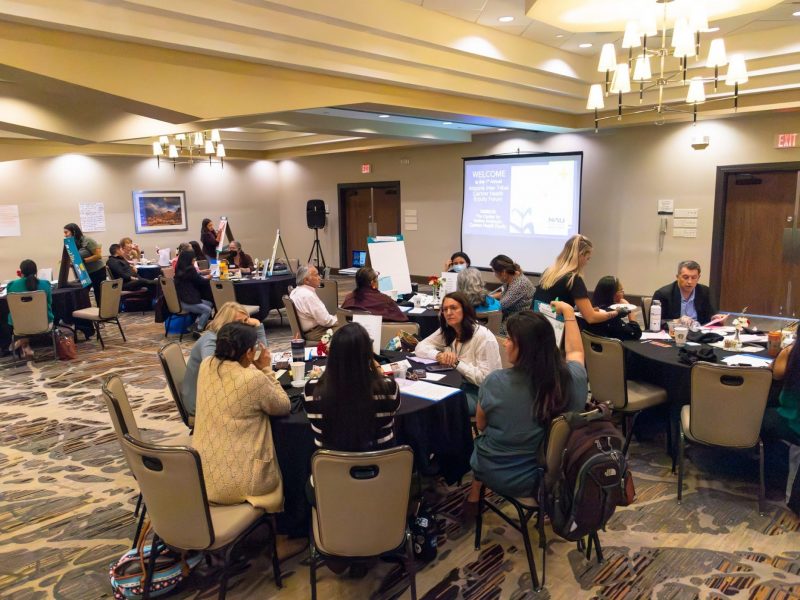NAU’s Native cancer research center celebrates an exciting first year
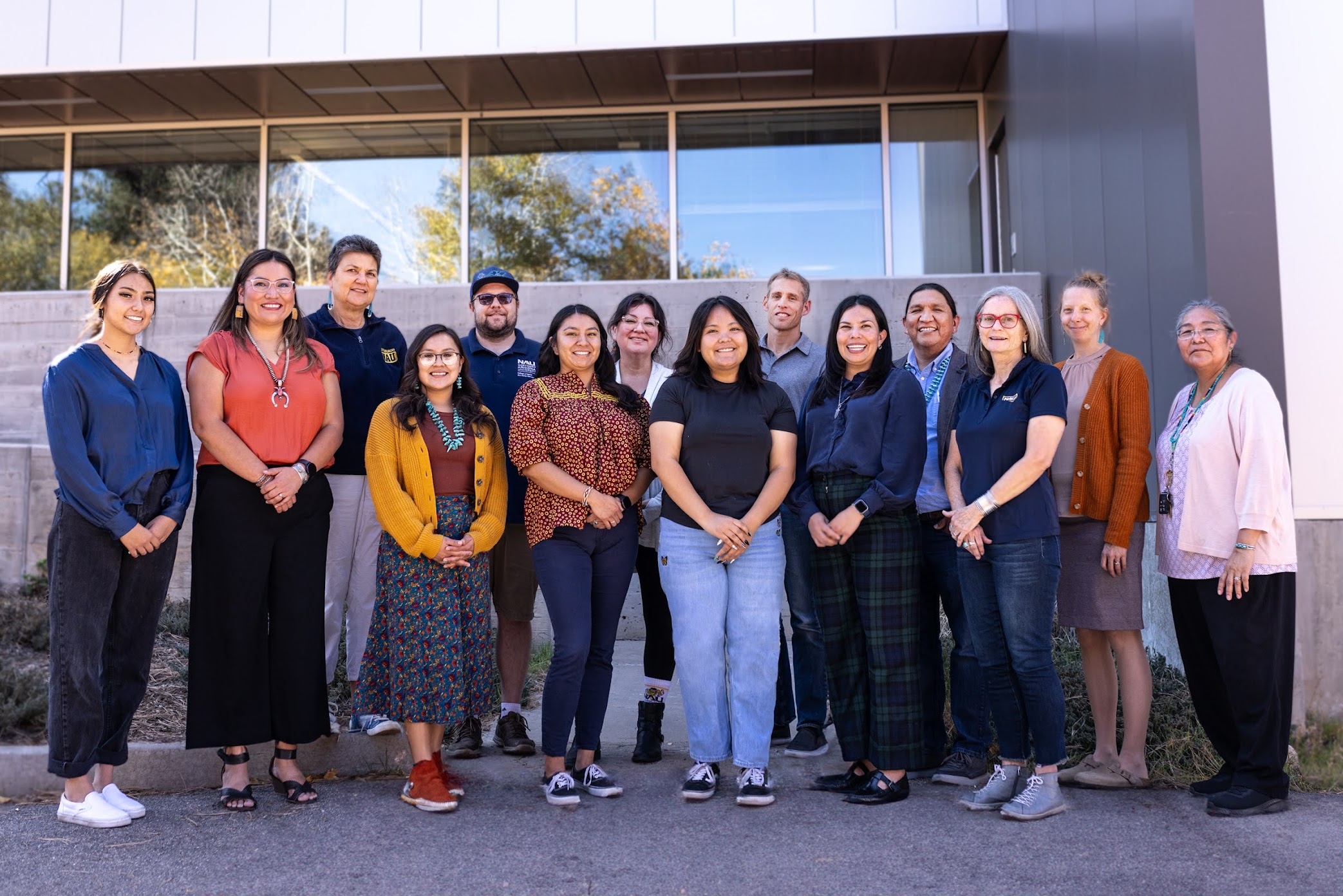
The Center for Native American Cancer Health Equity (C-NACHE) has completed its first year advancing cancer health equity among Native populations in the Southwest
A dedicated team of health equity experts, community members, and NAU faculty, staff, and students launched the initiative to new heights, raising awareness of the steps to address cancer health equity for Native American populations in Arizona.
In the first year, C-NACHE developed a Community Advisory Board, coordinated an annual inter-tribal forum, developed three outreach platforms for information dissemination, began working with participant Native nations to launch community assessments of cancer burden and services, and supported two scientists as they conduct research on Native American cancer health equity.
The Community Advisory Board
Tribal Council and program leaders representing the Native nations in Arizona were invited to join an inter-tribal Community Advisory Board (CAB), to serve as consultants to the C-NACHE team throughout the year. Round-table conversations between C-NACHE staff and CAB members offer a casual setting for the team to gain perspective on how Native nations are addressing cancer healthcare. In the first year, the CAB convened members from seven Native nations, two Native American serving health organizations, the Arizona and New Mexico state health departments, the Arizona Cancer Center, and the Inter-tribal Council of Arizona.
Annual Arizona Inter-tribal Cancer Health Equity Forum
One of the specific aims for C-NACHE was to establish an Arizona Inter-tribal Cancer Health Equity Forum that invites Native cancer health experts to educate, collaborate, and network with tribal and state leaders who can impact real advancement in health equity.
C-NACHE met this goal in September 2023 by holding the first inter-tribal cancer forum in northern Arizona, building a platform for diverse voices to flow freely with the infusion of cancer health data and policy updates. The forum catalyzed conversations that pinpointed key areas of Native American cancer heath equity focus, forming the foundation for AICHEF 2024, which is currently in development by C-NACHE administrative staff and is scheduled to be held in Flagstaff in October 2024.
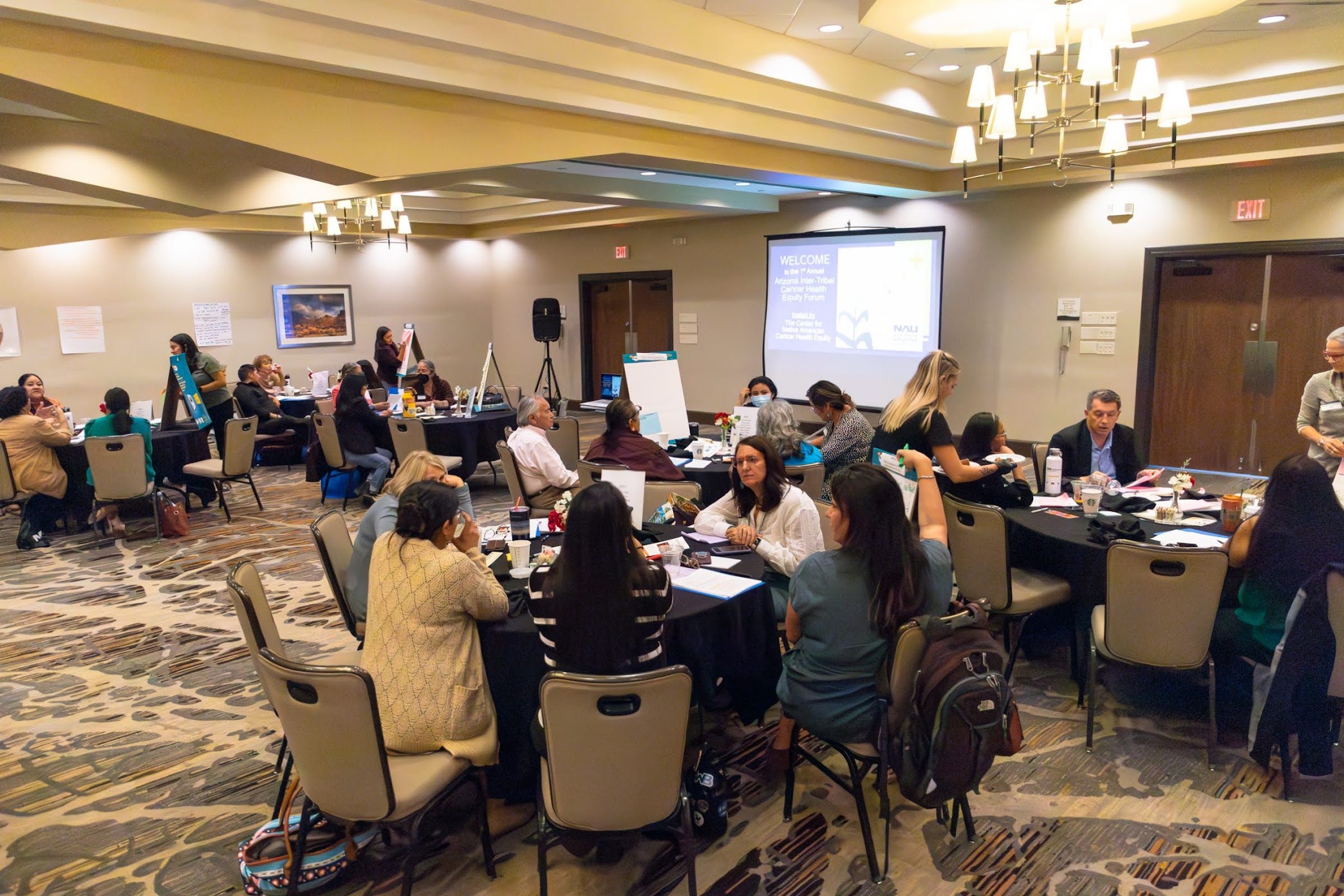
Outreach
Newsletter
The media team developed four bi-monthly issues of the C-NACHE eNewsletter. The newsletters, distributed by email, compile information for Native American communities on cancer risks, trends, resources, and stories.
Stay in the know: C-NACHE Newsletter!
Social media
More people than ever are finding their healthcare resources online through social media. Facebook and LinkedIn channels were created to deploy cancer data, policy, and resources along with C-NACHE events throughout the year. The media team utilizes American Indian Cancer Foundation media toolkits to align the center’s deliverables with the leading organization on cancer research.
Facebook: @Center for Native American Cancer Health Equity
LinkedIn: @Center for Native American Cancer Health Equity
Follow to learn more about Native cancer resources near you!
Community assessments
C-NACHE aims to work with Native nations across Arizona to gain knowledge on available community specific cancer screening and healthcare services and perceived cancer burden. Community assessments, facilitated by community liaison members, will provide information to health leaders on the needs and assets in their communities to support requests for additional resources. Currently, the Hualapai Tribe has approved the distribution of community assessments to their citizens.
Research projects
Two researchers at NAU have been working with collaborators in the Navajo Nation throughout the first year of the grant: Hendrik “Dirk” de Heer, PhD, MPH and Jani Ingram, PhD.
Navajo cancer workgroup informing policy and care
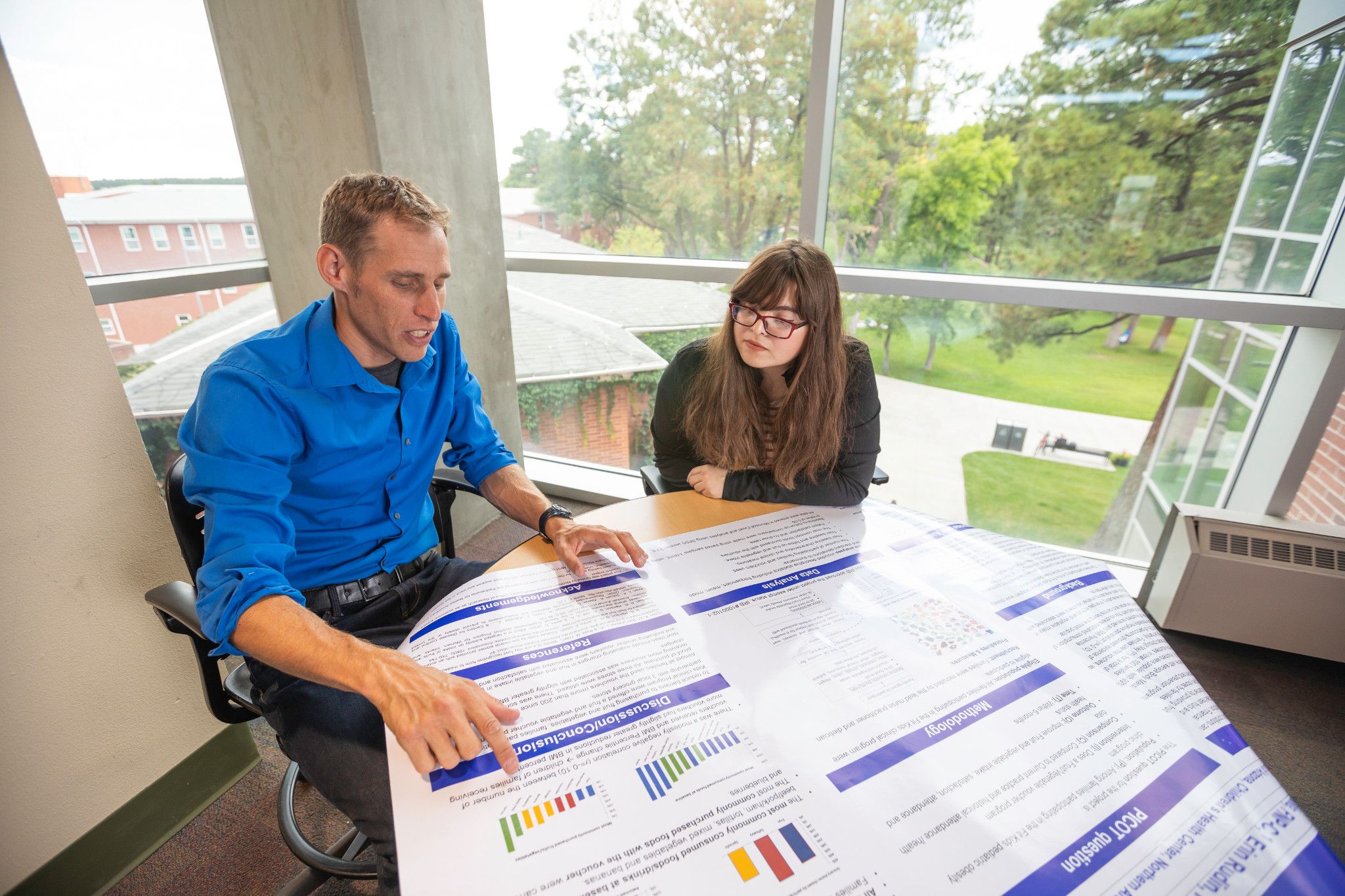
Below is his perspective of C-NACHE’s first research year
“In the first year, I am excited to have a finished Cancer Among the Navajo 2014-2018 report out (special thanks to Del Yazzie, Dornell Pete and Melinda Smith)! This will form the basis for several peer-reviewed manuscripts that we anticipate submitting over the next year. I am also really excited about having a full draft of our Cancer Data Dashboard in the Tableau system (thanks to Tex Etsitty and Nahtona ‘Note’ Louis). We anticipate an initial version to go live sometime in the Spring 2024, pending approvals from all partners. Finally, we are excited about having started drafting a Navajo Cancer Control plan, with efforts led by Linda Burhansstipanov, Priscilla Sanderson, Curtis Briscoe and Carol Goldtooth-Begay. As you can tell, this is truly a team effort with lots of contributors within NAU and from around our region, building on the Navajo Cancer Workgroup infrastructure they have developed over the past 20 years.”
Environmental exposure from legacy mining as a social determinant of health linked to kidney cancer
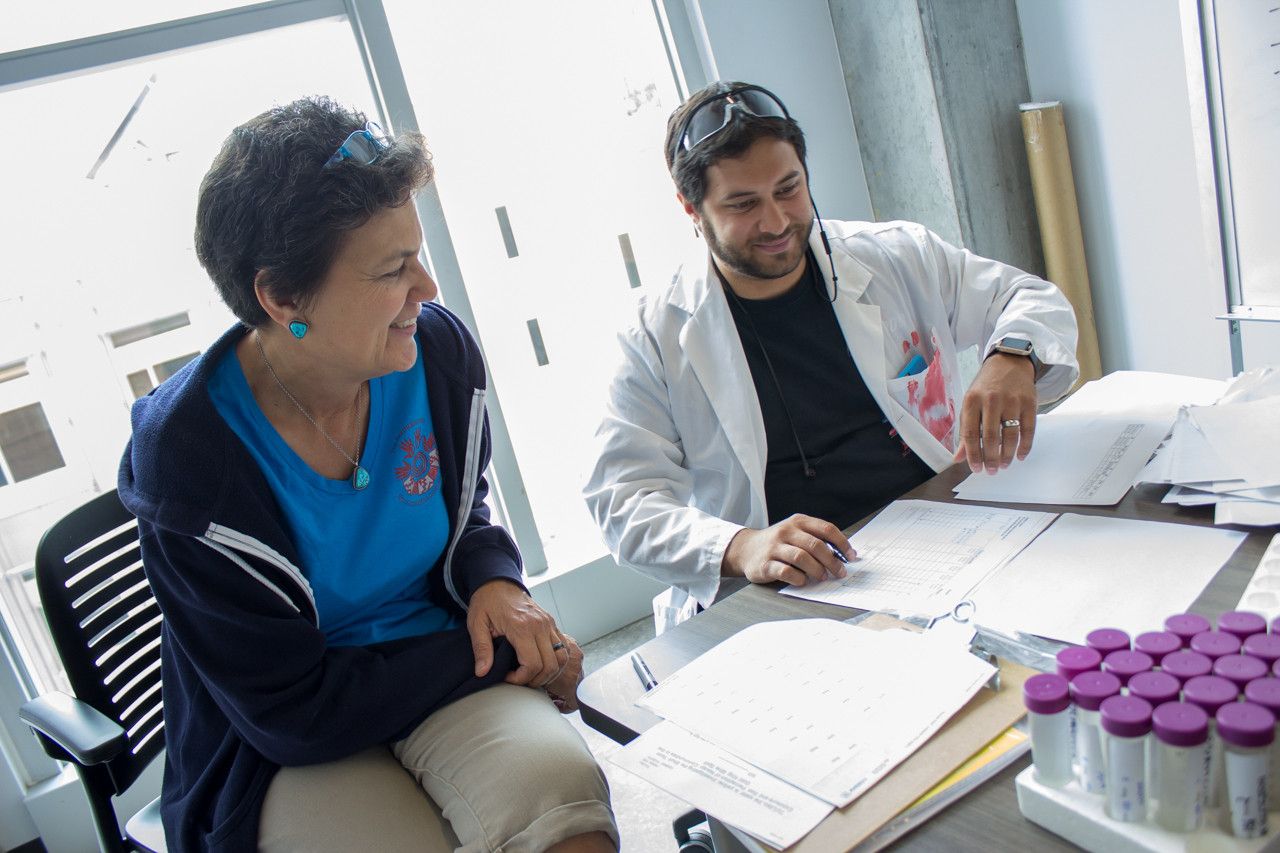
For the first year of Ingram’s C-NACHE research, she shared her progress:
“The past year has been focused on collecting resolutions of the support from Chapters within the Western Agency of the Navajo Nation as well as Tuba City Regional Health Care Center for the environmental work, environmental health survey, and medical record review. Currently, we are in the process of applying for Institutional Review Board approval from NAU. The next step will be to apply for approval from the Navajo Nation Human Research Review Board (NNHRRB). Additionally, the Ingram lab has begun environmental work in Cameron and Tuba City collecting water and dust samples for uranium, arsenic, and other potential elemental contaminants. Two environmental health surveys, one geared for the community and one geared for health workers, have been developed and tested with some community members. In the next few months, our plans are to deploy the surveys and begin medical health record review as soon as we have the approval from NNHRRB, continue working on environmental sampling, adding soil to our list of sample types, and add a post-doctoral scholar with expertise in environmental epidemiology to our team. One highlight this fall was that Brianson Yazzie, an undergraduate researcher, presented his research on water samples from Tuba City at the national Society for the Advancement of Chicanos and Native Americans in Science conference in Portland in October. He won an award for an outstanding presentation.”
Year 2 is underway
C-NACHE has built the framework and laid the foundation for the next three years of the award. Through the work of staff, researchers, and the CAB, C-NACHE will continue to host the Annual Arizona Inter-tribal Cancer Health Equity Forum, create a student-led webinar series, continue connecting through media outreach and community assessments, and supporting strong researchers as they collect data relevant to communities’ questions.
Stay connected by visiting C-NACHE’s website. If you have any questions that are not answered on the website, please reach out to CNACHE@nau.edu.
C-NACHE sponsored activities reported in this publication were supported by the American Cancer Society, award number CHERC-MSI-22-183-01. The content is solely the responsibility of the authors and does not necessarily represent the official views of the American Cancer Society.
